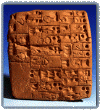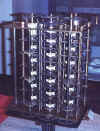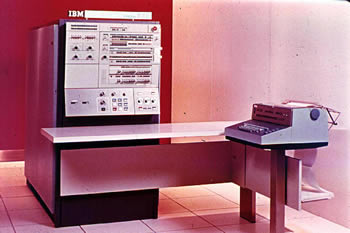

This timeline is written in chronological order. Starting way before our kind knew what would happen in the 20th century.
To realize what went on before people could even count the editors decided to start this historic account at less than 300.000 BC.The boundaries of the different era's are named after those used in history sciences. But that is where all analogy ends. Below you will find an explanation why.
 Clay tablet engraved with with cuneiform |
300.000BC - 1619ADThe era starts at what we call the Pre
Historic Era of computing. In this chapter you will read what
inventions people needed to make in order to be able to count and
record their findings.
|
soroban / abacus
|
1620 - 1885The Antiquity period shows us what devices were made by our fore fathers to help them with calculations and counting, but still the devices do not look like a computer
|
 Difference engine Babbage |
1886 - 1946Then we arrive at the pre
industrial era where we see the birth of computers, at least a
fair idea of it. In this period Lady Lovelace invented the method to program a "computer". In other words the programming language was born. A computer language is named after her : "ADA".
|
 IBM 360 system
|
1947 - 20..The industrial era brought us many examples of the ingenuity of our race. Also minituralisation took unequaled forms and culminated into the invention of the chip. The computer industry started by churning out computers by the hundreds to produce over 4 million computers per year around 2000 Prices went down drastically because of mass production and private persons soon had their own computer: the personal computer. Computers start to replace humans in a rapid pace doing the heavy and dirty work.
|
| ? | The Post
industrial era lifts a tip of the veil to us. New technologies are
on the verge to break through. Like amorphous memory in organic material,
computers that work with light in stead of electronic pulses, computers
that do calculations by means of recombining DNA or RNA. Computers that
can be painted on the wall making use of the budding nano technology
etc. etc.
Which of all these inventions will be remembered after 100 years?
Because they made it to the consumer or influenced the development
of other machines greatly. |
Notes
Juergen Schmidhuber wrote us:
also I'd like to add that your notions of preindustrial era etc. are very nonstandard and confusing - the term "industrial era" usually refers to the time after 1760 when Watt built a steam engine in the UK; antiquity usually refers to around 500 b.c. when the Greeks invented the first algorithms. Maybe you want to replace your entry "Industrial Era 1947-..." by "Modern Computer History," but it starts in 1941 with Zuse's Z1, not in 1947....
Our comment:
When you look at the events that took place in the context of ordinary history you are strictly speaking right. But if you take the developments of computing in account the boundaries are different. That is why we wrote "Why ..." at each period of the timeline on the "About the timeline" page.
In this light the Z1 is strictly spoken not an industrial
made machine, is one of a kind and never sold to anyone. Industrial made
means to us: made in series in an industrial process, and sold to end users.
Industrial process is where you have a defined workflow of handling and
manufacturing and not made to order by one single person.
|
There are also a number of story lines throughout the Chronological History of Computers: The chronological events in the development of computers
|
|
When you really get curious then there are numerous hyperlinks to :
You just have to follow the leads or use the table of contents or other indexes on this site |
|
Since it is not our intention to create an encyclopedia of computer history and related sciences we have taken the liberty to mention only the most important developments in the History of Computers. But as time goes by we will be putting in more and more detailed
information and even more story lines onto this site. So in the next 100 years ;=) it might even grow out into an encyclopedic
form but it is not our prime objective. See also the page about this project |
![]()
 |
Last Updated on 13-Feb-2004 | For suggestions please mail the editors |